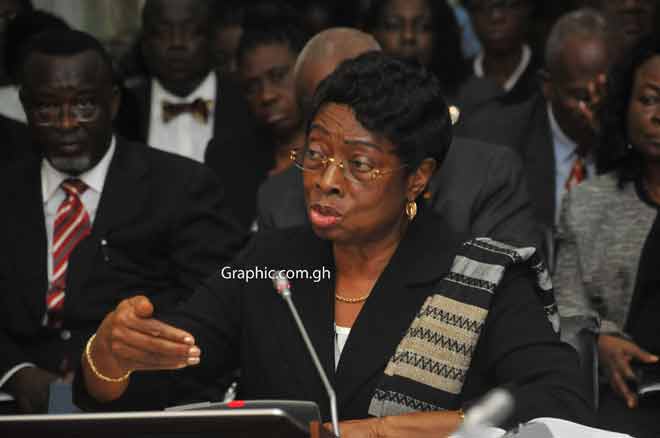
Chief Justice nominee Sophia Akuffo defends contempt of court
The Chief Justice nominee, Justice Sophia Akuffo, says the law on contempt of court is meant to protect the sanctity and integrity of the Judiciary but not to gag anyone.
Advertisement
She said there was the need to safeguard the sanctity of the Judiciary because it was the backbone of every stable democracy.
Answering questions from the Appointments Committee of Parliament (ACP) Friday on the jailing of what has come to be known as the “Montie Three”, Ms Justice Akuffo said the Judiciary was the heart of any democratic institution and the day that was undermined, the country suffered at the end.
Breakdown of justice
“It is when the justice system breaks down that the nation breaks down...If there is no Judiciary then we are back in the jungle.
“Contempt of court is not intended to gag anybody. Contempt of court, its focus is on the protection of the sanctity and integrity of the judicial process. It is intended to protect the process itself, not even the individuals who were offended.
“It is to protect the institution because, excuse me Honourable Legislators, at the end of the day it is when the justice system breaks down that is when a nation breaks down.
“There are countries without a legislature but they manage; there are countries with dubious executive structures but they manage so long as there is something they can call the Judiciary,” she explained.
Asked why the management of the Network Broadcasting Limited was punished in addition to the Montie Three – Salifu Maase (Mugabe), Godwin Ako Gunn, and Alistair Nelson – Ms Justice Akuffo said: “To start with, I am not comfortable about being called upon to justify a judgement that we have delivered, but in general terms concerning the scope of exercising the contempt power or labelling something to be contemptuous, I believe that each case will dictate the outcome.”
Lawyers and advertisement
Touching on advertisement by lawyers of their services, Mrs Akuffo said, she was opposed to lawyers advertising their services either in the traditional or social media.
She said self-advertisement was one of those frowned on, adding in many jurisdictions, there were some that permitted it, “but I have not studied the scope of those permissions. But Facebook, Twitter… at the moment will not fall in the permissible areas. You can have a website and put yourself on your website.”
Ms Justice Akuffo, who was grilled for about six hours, said the practice of lawyers advertising their services was considered “improper conduct by lawyers.”
Dignity of the bar
Reacting to a question on claims that the Judicial Service was operating archaic laws that barred advertisement on social media, Ms Justice Akuffo said such issues were mainly regulatory and did not have much to do with the Judicial Service.
She said the dignity of the bar was as important as the dignity of the Judiciary, and the idea of lawyers touting themselves on social media was personally distasteful, adding, “But that aside, the law is there clearly against touting because touting is an improper conduct on the part of the lawyer.”
Delay in justice delivery
The Chief Justice nominee promised to do her best to deliver efficient justice to minimise incidents of people punishing suspects in their own ways.
"As justice delayed is justice denied, justice hurried is justice buried," she said, adding that the right processes needed to be adhered to in ensuring the delivery of quality justice.
She said although the phenomenon had nothing to do with the Judiciary, effective justice delivery could help to deal with it. She explained that a lot of the time, aggrieved parties saw those who had wronged them walking free without understanding the processes and “so they resort to seeking self-help to get justice.’’
“Mob justice is people beating people, but land guard which is a form of self-help is rampant because there is a failure in the case management,” she said.
Ghana School of Law
Referring to the relevance of the Ghana School of Law, Ms Justice Akuffo said the country’s legal training would suffer if the school was scrapped.
She explained that the school provided practical legal training to students, which was absent in the various faculties of law at the universities, where Bachelor of Law degrees were obtained.
Ms Justice Akuffo said the universities educated students academically on the law, which was not sufficient to make one a lawyer.
“The Ghana School of Law is a professional training facility and that is where the theories learnt in classrooms are supposed to be taught from a more practical point of view.
“I am not one of those who subscribe to the Ghana School of Law being scrapped,’’ she said.



